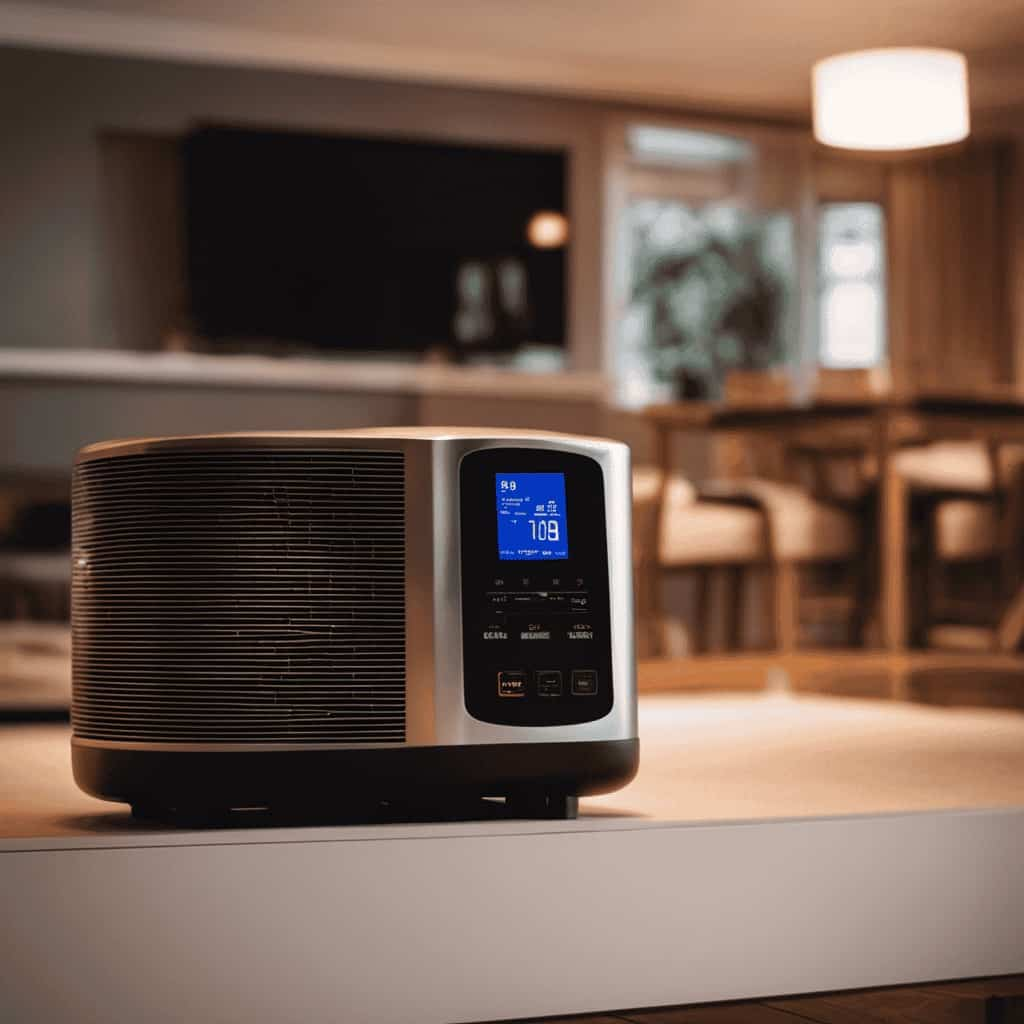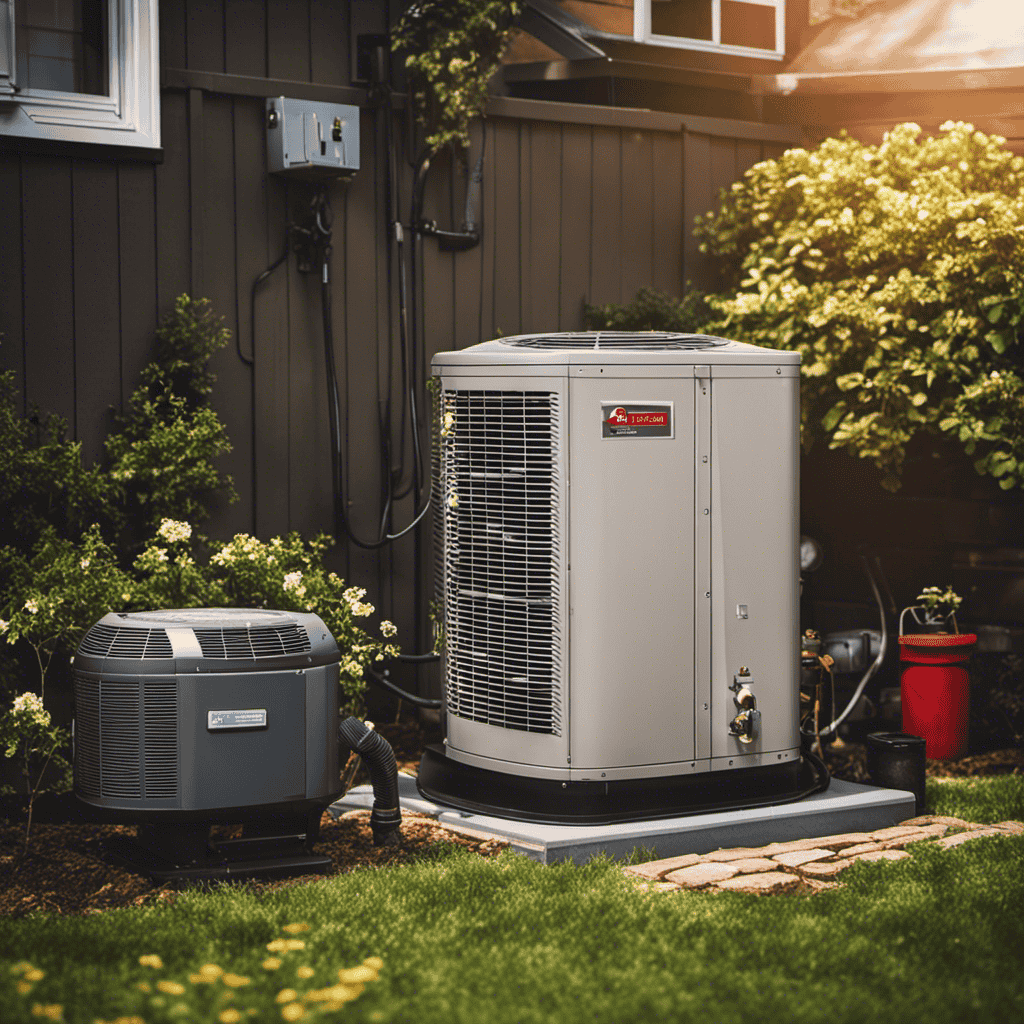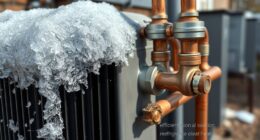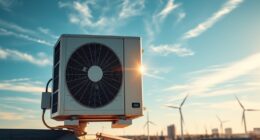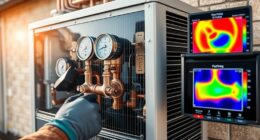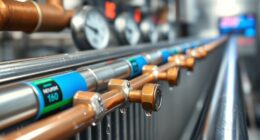Here’s an eye-opening fact: were you aware that taking preventive measures can help prevent up to 70% of heat pump issues? In fact, by properly maintaining your heat pump, you can improve its efficiency and avoid costly repairs.
In this article, we’ll dive into the importance of heat pump maintenance, common preventable issues, and how neglecting maintenance can impact efficiency.
Get ready to learn some valuable tips and tricks to keep your heat pump running smoothly and saving you money.
Key Takeaways
- Regular maintenance is crucial for optimal heat pump performance and longevity.
- Neglecting maintenance significantly reduces heat pump efficiency.
- Filters and coil cleaning are essential for maintaining heat pump performance.
- Preventing and addressing specific issues through inspections and regular maintenance checks can help improve efficiency and prevent major problems.
The Importance of Heat Pump Maintenance
We believe that regular heat pump maintenance is crucial for optimal performance and longevity. The importance of regular maintenance can’t be overstated. By scheduling professional maintenance services, homeowners can ensure that their heat pumps are operating at peak efficiency.

Regular maintenance includes tasks such as cleaning or replacing filters, inspecting electrical connections, lubricating moving parts, and checking refrigerant levels. These maintenance tasks help to prevent issues that can arise from neglect or wear and tear. By addressing any potential problems early on, homeowners can avoid costly repairs down the line.
Additionally, regular maintenance improves energy efficiency, saving homeowners money on their utility bills. It also extends the lifespan of the heat pump, reducing the need for premature replacement.
With the benefits of professional maintenance services in mind, let’s now delve into the common preventable issues with heat pumps.
Common Preventable Issues With Heat Pumps
While regular maintenance can help prevent many issues with heat pumps, there are still common problems that can arise if not addressed promptly. These issues can often be prevented through proper installation and regular troubleshooting techniques.

Here are three common preventable issues with heat pumps:
Refrigerant leaks: Improper installation or lack of maintenance can lead to refrigerant leaks. These leaks not only reduce the efficiency of the heat pump but can also cause damage to the compressor.
Electrical problems: Faulty wiring or electrical connections can result in issues with the heat pump’s performance. Regular inspections and proper wiring techniques can help prevent these problems.
Airflow restrictions: Blocked or dirty air filters, ductwork issues, or obstructed vents can restrict the airflow and reduce the efficiency of the heat pump. Regular cleaning and maintenance can help prevent these airflow restrictions.

How Neglecting Maintenance Impacts Efficiency
Neglecting maintenance significantly reduces the efficiency of heat pumps. When maintenance is neglected, the consequences can have a detrimental impact on energy consumption. Regular maintenance is crucial to ensure that a heat pump operates at its optimal level and consumes minimal energy.
Failure to clean and inspect the various components of a heat pump can lead to reduced performance and increased energy consumption. Dust and debris can accumulate in the filters and coils, obstructing airflow and causing the system to work harder to maintain the desired temperature. This increased workload not only decreases the efficiency of the heat pump but also results in higher energy bills. Therefore, neglecting maintenance has a direct impact on energy consumption and should be avoided.
Understanding the importance of maintenance is essential in maximizing the efficiency of a heat pump and minimizing energy costs.
Now let’s move on to understanding the role of filters in heat pump performance.

Understanding the Role of Filters in Heat Pump Performance
Filters play an integral role in the performance of heat pumps, as they help to trap and remove dust and debris from the air. Understanding filter maintenance is crucial for maintaining optimal heat pump efficiency. Here are three key points to consider:
Regular filter cleaning or replacement: Dirty filters restrict airflow, making the heat pump work harder and reducing its efficiency. It’s recommended to clean or replace filters every 1-3 months, depending on usage and air quality.
Improved indoor air quality: Clean filters not only enhance heat pump performance but also improve the quality of the air you breathe. They capture allergens, dust, and other particles, reducing the risk of respiratory issues and maintaining a healthier environment.
Energy savings: By ensuring clean filters, you can save energy and reduce utility bills. A dirty filter causes the heat pump to consume more energy to achieve the desired temperature, resulting in increased energy costs.
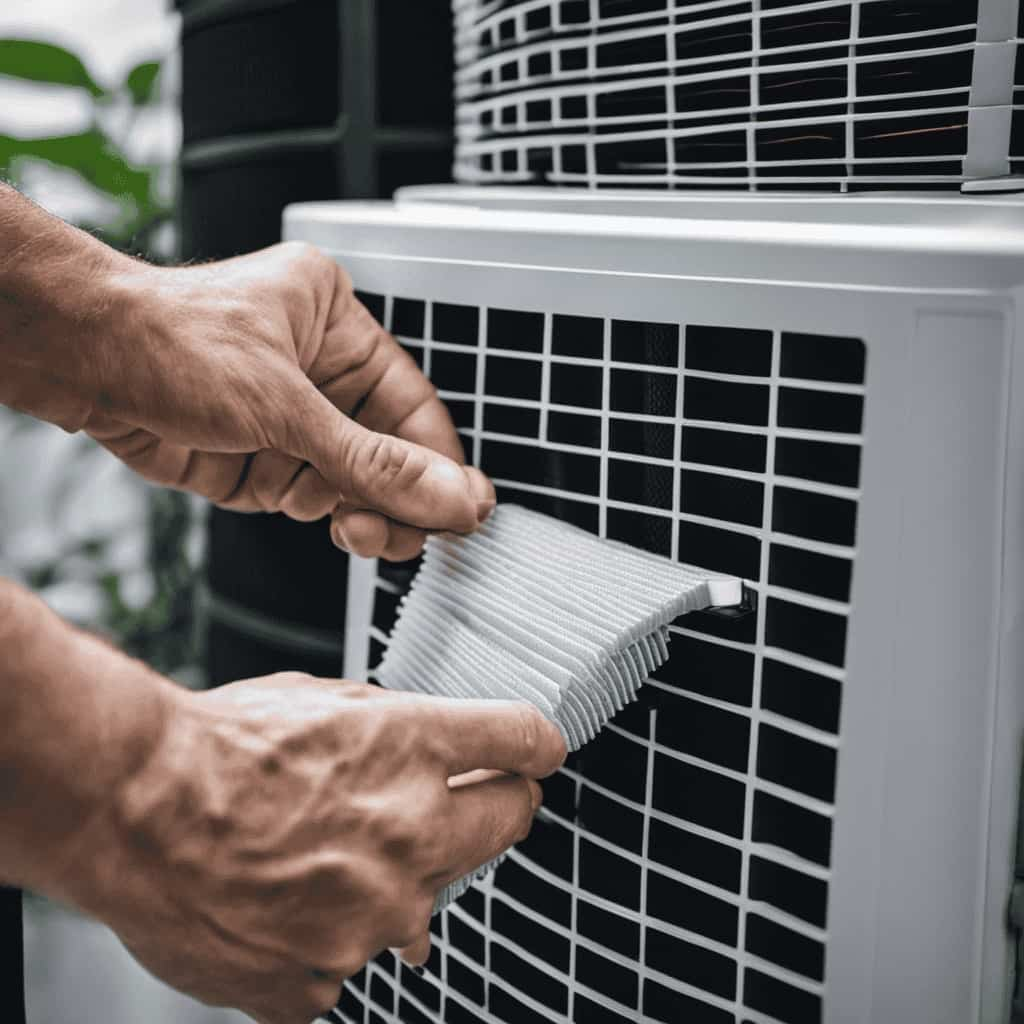
Understanding and properly maintaining filters is essential for maximizing heat pump efficiency and improving indoor air quality.
Proper Cleaning Techniques for Heat Pump Coils
We recommend regularly cleaning the heat pump coils every 6-12 months to maintain optimal efficiency and prevent potential issues. Proper maintenance and coil cleaning techniques are essential for keeping your heat pump running smoothly.
Over time, dust, dirt, and debris can accumulate on the coils, reducing their ability to transfer heat effectively. This can result in decreased efficiency and potentially lead to more serious problems down the line.
To clean the coils, start by turning off the power to the heat pump. Then, use a soft brush or vacuum cleaner to remove any loose debris. For more stubborn dirt, a mild detergent mixed with water can be used to gently clean the coils. Rinse thoroughly and allow the coils to dry completely before turning the power back on.

Preventing Refrigerant Leaks in Heat Pumps
To prevent refrigerant leaks in heat pumps, it’s important to regularly check for any signs of damage or wear on the refrigerant lines. Here are three key steps in refrigerant leak prevention and maintenance impact on efficiency:
Visual Inspection: Inspect the refrigerant lines for any signs of corrosion, cracks, or loose fittings. This will help identify potential areas of leakage and prevent further damage to the system.
Proper Installation: Ensure that the refrigerant lines are properly installed and insulated. Improper installation can lead to leaks and decreased efficiency.
Regular Maintenance: Schedule regular maintenance checks with a qualified technician to detect and repair any refrigerant leaks. Regular maintenance not only prevents leaks but also ensures optimal efficiency and performance of the heat pump system.

Regular inspections and tune-ups play a crucial role in maintaining the efficiency and longevity of heat pumps. By identifying and addressing potential issues early on, homeowners can avoid costly repairs and ensure the optimal functioning of their heat pump systems.
The Significance of Regular Inspections and Tune-Ups
Regular inspections and tune-ups are essential for maintaining the efficiency and performance of our heat pump systems. Regular maintenance plays a crucial role in ensuring that our heat pumps operate optimally and continue to provide us with the comfort we need.
By scheduling regular inspections, we can identify and address any potential issues before they escalate into major problems. During these tune-ups, a professional technician will thoroughly clean and inspect the various components of our heat pump, such as the coils, filters, and fans. They’ll also check the refrigerant levels and make any necessary adjustments.
These routine inspections and tune-ups not only help improve the performance of our heat pump systems but also extend their lifespan, saving us from costly repairs and replacements down the line.

Addressing Electrical Problems in Heat Pump Systems
When it comes to heat pump systems, electrical problems are a common issue that can lead to system failures. It’s important to address these electrical problems promptly to prevent any further damage or malfunctions.
Common Electrical Heat Pump Issues
We frequently encounter electrical issues in our heat pump systems that can be easily addressed to improve efficiency. Here are three common electrical problems in heat pump systems and how to troubleshoot them:
Faulty Capacitors: Capacitors are responsible for supplying the necessary energy to start the heat pump’s motors. If the capacitors are defective or worn out, the heat pump may struggle to start or fail to operate efficiently. To address this issue, check the capacitors for bulging or leaking and replace them if necessary.
Wiring Issues: Loose or damaged wiring can cause electrical problems in a heat pump system. Inspect the wiring connections and tighten any loose connections. If you notice any frayed or damaged wires, they should be replaced promptly to prevent further issues.

Malfunctioning Thermostat: A faulty thermostat can lead to inaccurate temperature readings and improper heat pump operation. Check the thermostat settings and ensure they’re correctly calibrated. If the thermostat is unresponsive or showing incorrect readings, consider replacing it with a new one.
Preventing Electrical System Failures
To effectively prevent electrical system failures in our heat pump systems, we must regularly inspect and maintain all electrical components. One important step is to prevent condensation issues, as moisture can cause damage to electrical connections. We should ensure that all electrical connections are properly insulated and protected from moisture. Regularly checking for any signs of condensation and promptly addressing them can help prevent potential electrical failures.
Another crucial aspect is troubleshooting electrical connections. This involves checking for loose or corroded connections and tightening or cleaning them as necessary. Additionally, inspecting the wiring for any frayed or damaged insulation is important.
Avoiding Thermostat Malfunctions for Optimal Efficiency
The key to avoiding thermostat malfunctions for optimal efficiency is regular maintenance and proper usage. By following these steps, you can ensure that your thermostat functions smoothly and efficiently:

Thermostat Troubleshooting: Regularly check your thermostat for any signs of malfunction, such as incorrect temperature readings or unresponsive controls. If you notice any issues, consult the user manual or contact a professional technician for assistance.
Optimizing Temperature Settings: Set your thermostat to the appropriate temperature for each season. During colder months, aim for a comfortable but energy-efficient temperature, and in warmer months, adjust the settings to minimize energy consumption. Utilizing programmable thermostats can also help automate temperature adjustments and maximize efficiency.
Regular Maintenance: Periodically clean your thermostat to remove any dust or debris that may affect its performance. Additionally, ensure that the thermostat is securely mounted and the wires are properly connected.
By implementing these practices, you can avoid thermostat malfunctions and optimize the efficiency of your heat pump, leading to increased energy savings and a longer lifespan for your system.

Now, let’s explore some tips for extending the lifespan of your heat pump.
Tips for Extending the Lifespan of Your Heat Pump
By following these tips, we can greatly increase the lifespan of our heat pump and maximize its efficiency.
One important tip is to regularly clean and replace the air filters. Clogged filters restrict airflow and make the heat pump work harder, leading to increased wear and tear.
Another tip is to schedule regular maintenance with a professional technician. They can inspect and clean the heat pump, identify any potential issues, and ensure it’s operating at its best.

It’s also important to keep the area around the heat pump clear of debris and vegetation to allow for proper airflow.
Lastly, adjusting the thermostat settings and using programmable thermostats can help optimize the heat pump’s performance.
By following these tips, we can extend the lifespan of our heat pump and enjoy its efficient operation for many years to come.
Transition: Now that we know how to extend the lifespan and maximize the efficiency of our heat pump, let’s explore the cost-savings benefits of preventative heat pump care.

The Cost-Savings Benefits of Preventative Heat Pump Care
We can save money by investing in preventative heat pump care. Maintaining our heat pumps can help us avoid costly repairs and increase their lifespan. Here are three cost-saving strategies and energy-efficient alternatives to consider:
Regular maintenance: Schedule annual maintenance checks with a qualified HVAC technician. They’ll clean and inspect your heat pump, ensuring it operates at peak efficiency. This can prevent breakdowns and improve energy efficiency, saving you money on utility bills.
Air filter replacement: Regularly replace air filters to keep your heat pump running smoothly. Clogged filters restrict airflow, forcing the system to work harder and consume more energy. By installing clean filters, you can reduce energy consumption and lower your heating and cooling costs.
Programmable thermostat: Upgrade to a programmable thermostat to maximize energy savings. Set temperature schedules that align with your daily routines, allowing the heat pump to operate efficiently when needed and reduce energy consumption when you’re away.

Frequently Asked Questions
How Much Does It Cost to Replace a Heat Pump?
The cost of heat pump installation varies depending on factors such as the size of the unit, the complexity of the installation, and any additional upgrades needed. It is important to consider these factors when calculating the cost of replacing a heat pump.
Can I Clean My Heat Pump Coils Myself, or Should I Hire a Professional?
Cleaning heat pump coils yourself can save money, but hiring a professional ensures thorough cleaning and prevents damage. Remember, "A stitch in time saves nine." Professional coil cleaning maximizes efficiency and extends the lifespan of your heat pump.
How Often Should I Have My Heat Pump Inspected and Tuned Up?
We should schedule regular maintenance for our heat pump to ensure optimal performance. Cleaning the coils should be done at least once a year. It’s important to keep the system running efficiently and prevent potential issues.
Are There Any Specific Signs or Symptoms That Indicate My Heat Pump Needs Maintenance?
Regular heat pump maintenance is crucial to prevent malfunction. Signs of a malfunctioning heat pump include reduced airflow, strange noises, and uneven heating or cooling. We recommend scheduling regular inspections to ensure optimal performance.

What Are Some Common Electrical Problems That Can Occur in Heat Pump Systems?
Common causes of electrical problems in heat pump systems include faulty wiring, blown fuses, and malfunctioning capacitors. Troubleshooting techniques involve inspecting connections, testing components, and replacing damaged parts.
How Can Heat Pump Efficiency Help Achieve Abundance in Climate Control?
Heat pump efficiency is crucial in achieving abundant climate control. By optimizing the performance of heat pumps, energy consumption can be reduced while maintaining desired temperatures. With abundance in heat pump efficiency, energy costs decrease, environmental impact is minimized, and comfort is maximized. Investing in efficient heat pump systems is a sustainable solution for achieving optimal climate control in both residential and commercial settings.
Conclusion
In conclusion, proper maintenance of heat pumps is crucial for optimal efficiency and cost-savings. By addressing common preventable issues, such as cleaning coils and addressing electrical problems, homeowners can boost their heat pump’s performance and extend its lifespan.
Neglecting maintenance not only impacts efficiency but also leads to higher energy bills and potential system breakdowns. By investing in preventative care, homeowners can enjoy a well-functioning heat pump that provides comfort and savings for years to come.
